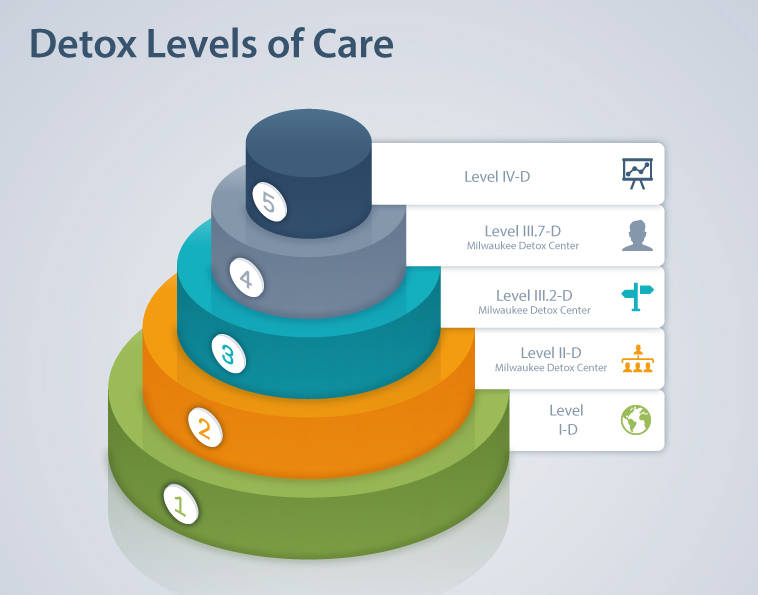Levels of Care and Patient Placement
At Milwaukee Detox Center, our counselors carefully evaluate all possible patient needs in determining their placement and level of care.
At Milwaukee Detox Center all possible needs of patients seeking detoxification and treatment services are considered when making decisions regarding admission, the appropriate treatment settings, and the required intensity of services (i.e., level of care).
Addiction medicine has developed an efficient system of care that matches patients’ clinical needs with the appropriate care setting in the least restrictive and most cost-effective manner.
Least restrictive refers to patients’ civil rights and their right to choice of care. There are three specific themes of historical and clinical importance:
- Patients should be treated in those settings that least interfere with their civil rights and freedom to participate in society.
- Patients should be able to disagree with clinician recommendations for care. While this includes the right to refuse any care at all, it also includes the right to obtain care in a setting of their choice (as long as considerations of dangerousness and mental competency are satisfied). It implies a patient’s right to seek a higher or different level of care than that which our clinician is offering.
- Patients are informed participants with our counselors in defining their care plan.
Because the choice of a treatment setting and intensity of treatment (level of care) are so important, the American Society of Addiction Medicine (ASAM) created the Patient Placement Criteria, Second Edition, Revised (PPC-2R) a consensus-based clinical tool for matching patients to the appropriate setting and levels of care. These levels of care are:
- Level I-D: Ambulatory Detoxification without Extended Onsite Monitoring (e.g., physician’s office, home health care agency). This level of care is an organized outpatient service monitored at predetermined intervals.
- Level II-D: Ambulatory Detoxification with Extended Onsite Monitoring (e.g., day hospital service). This level of care is monitored by appropriately credentialed and licensed nurses. Milwaukee Detox Center is certified in this category pursuant to Wisconsin DHS 75.08.
- Level III.2-D: Clinically Managed Residential Detoxification (e.g., nonmedical or social detoxification setting). This level emphasizes peer and social support and is intended for patients whose intoxication and/or withdrawal is sufficient to warrant 24-hour support.
- Level III.7-D: Medically Monitored Inpatient Detoxification (e.g., freestanding detoxification center). Unlike Level III.2.D, this level provides 24-hour medically supervised detoxification services. Milwaukee Detox Center is certified in this category pursuant to Wisconsin DHS 75.07.
- Level IV-D: Medically Managed Intensive Inpatient Detoxification (e.g., psychiatric hospital inpatient center). This level provides 24-hour care in an acute care inpatient setting.
The above descriptions and explanations are excerpted from:
Center for Substance Abuse Treatment. Detoxification and Substance Abuse Treatment. Rockville (MD): Substance Abuse and Mental Health Services Administration (US); 2006. (Treatment Improvement Protocol (TIP) Series, No. 45.) 2 Settings, Levels of Care, and Patient Placement. Accessed June 22, 2021 from: https://www.ncbi.nlm.nih.gov/books/NBK64109/

Milwaukee Detox Center is licensed for 65 residential beds, of which 15 beds are devoted to DHS 75.09 patients and 50 for the 75.07 Medically Monitored Inpatient Detoxification.
Additional Outpatient Services
In order to provide a comprehensive range of services and continuum of care, Milwaukee Detox Center collaborates with American Telepsychiatry® – www.atelepsych.com to provide patients outpatient services pursuant to DHS 75.13 and DHS 35. Our facility is certified as a “Place of Service” for American Telepsychiatry® pursuant to these latter Code sections.
